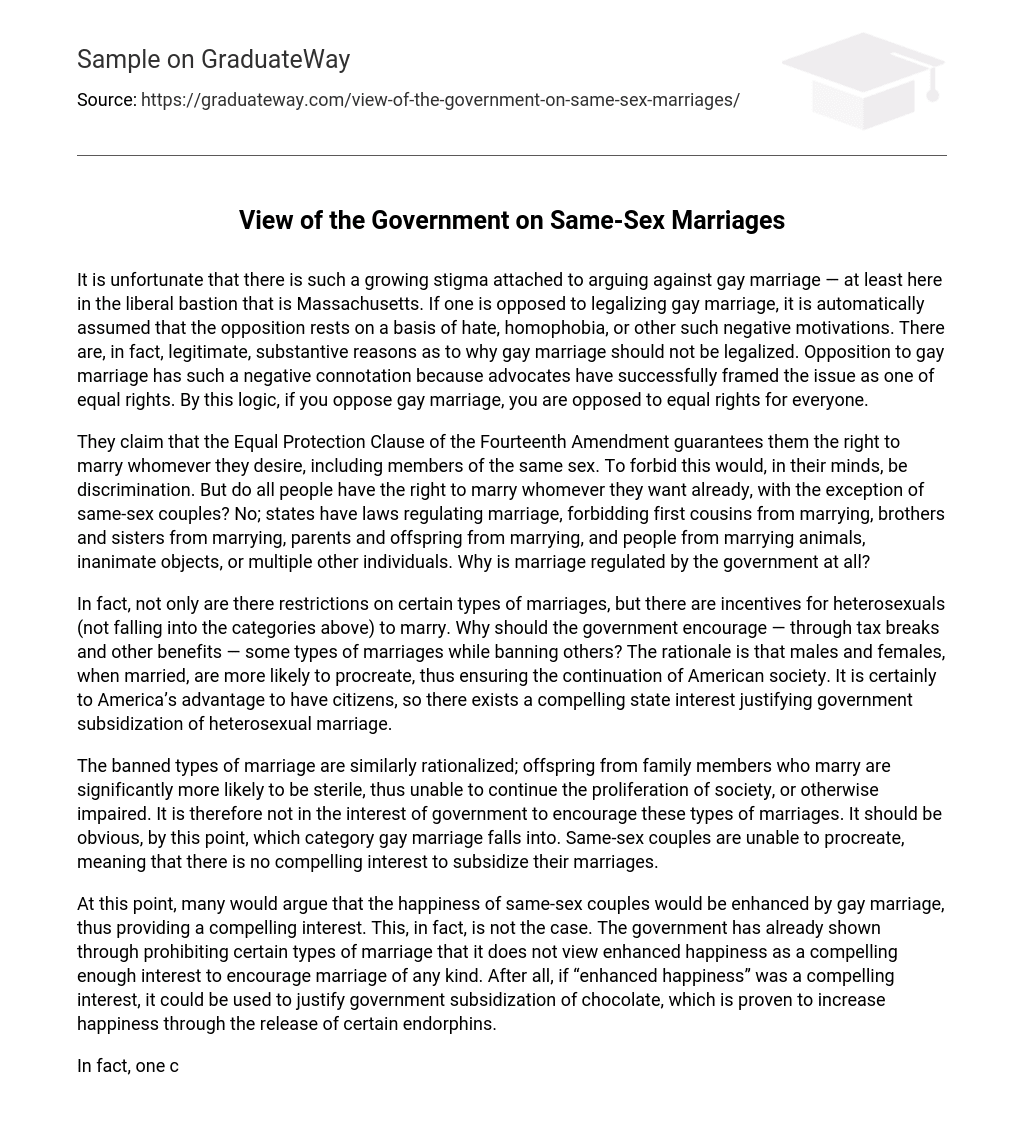It is unfortunate that there is such a growing stigma attached to arguing against gay marriage — at least here in the liberal bastion that is Massachusetts. If one is opposed to legalizing gay marriage, it is automatically assumed that the opposition rests on a basis of hate, homophobia, or other such negative motivations. There are, in fact, legitimate, substantive reasons as to why gay marriage should not be legalized. Opposition to gay marriage has such a negative connotation because advocates have successfully framed the issue as one of equal rights. By this logic, if you oppose gay marriage, you are opposed to equal rights for everyone.
They claim that the Equal Protection Clause of the Fourteenth Amendment guarantees them the right to marry whomever they desire, including members of the same sex. To forbid this would, in their minds, be discrimination. But do all people have the right to marry whomever they want already, with the exception of same-sex couples? No; states have laws regulating marriage, forbidding first cousins from marrying, brothers and sisters from marrying, parents and offspring from marrying, and people from marrying animals, inanimate objects, or multiple other individuals. Why is marriage regulated by the government at all?
In fact, not only are there restrictions on certain types of marriages, but there are incentives for heterosexuals (not falling into the categories above) to marry. Why should the government encourage — through tax breaks and other benefits — some types of marriages while banning others? The rationale is that males and females, when married, are more likely to procreate, thus ensuring the continuation of American society. It is certainly to America’s advantage to have citizens, so there exists a compelling state interest justifying government subsidization of heterosexual marriage.
The banned types of marriage are similarly rationalized; offspring from family members who marry are significantly more likely to be sterile, thus unable to continue the proliferation of society, or otherwise impaired. It is therefore not in the interest of government to encourage these types of marriages. It should be obvious, by this point, which category gay marriage falls into. Same-sex couples are unable to procreate, meaning that there is no compelling interest to subsidize their marriages.
At this point, many would argue that the happiness of same-sex couples would be enhanced by gay marriage, thus providing a compelling interest. This, in fact, is not the case. The government has already shown through prohibiting certain types of marriage that it does not view enhanced happiness as a compelling enough interest to encourage marriage of any kind. After all, if “enhanced happiness” was a compelling interest, it could be used to justify government subsidization of chocolate, which is proven to increase happiness through the release of certain endorphins.
In fact, one could argue that the government should subsidize anything and everything that makes someone happy. Thus, “enhanced happiness” can clearly not be considered a compelling enough interest to justify the recognition and, therefore, subsidization of gay marriage. While same-sex couples certainly cannot reproduce themselves, artificial insemination for lesbians would be an option. Or it might be argued that the government should subsidize gay marriages to make it easier to adopt.
Despite neither arguments of these being good enough reasons to justify legalizing any of the types of banned marriages discussed earlier, it bears discussing. Regarding families where the father is absent, research by University of Canterbury professor Bruce J. Ellis has shown that, “greater exposure to father absence was strongly associated with elevated risk for early sexual activity and adolescent pregnancy. ” This is relevant to the debate around same-sex marriage because, in lesbian couples, any daughter would certainly be growing up apart from their biological father, thus increasing the risk of these unfortunate effects.
Further evidence on the importance of having both a mother and father is provided by Stanford psychologist Eleanor MacCoby, who points out that “mothers, on average, may have somewhat stronger parental ‘instincts’ when it comes to responding to young infants. ” In male gay couples, this is by definition not the case. An increasing body of evidence shows that it is indeed more advantageous for children to grow up having both a mother and a father. Once again, we cannot put the “enhanced happiness” that same-sex couples would get from raising a child above the well-being of that child.
Gay marriage is not a civil rights issue; it is a question of whether or not there exists a compelling enough interest for the government to subsidize and encourage gay marriage. As same-sex couples cannot procreate and, in fact, have the potential to harm any children they might raise, it is certainly in the interest of the federal government to maintain the stance it presented in the Defense of Marriage Act (DOMA). Section 2 states “the word ‘marriage’ means only a legal union between one man and one woman as husband and wife, and the word ‘spouse’ refers only to a person of the opposite sex who is a husband or a wife. ”





